
Memory can be a strange and selective thing. Some people can recall exact lines from sitcoms they watched years ago but can’t remember their cousin’s birthday without a Facebook reminder. This unevenness in recall isn’t about laziness or carelessness – it’s about how the brain prioritizes, encodes, and retrieves information. Understanding why we remember some things in vivid detail while others vanish from awareness can give us insight into attention, emotional connection, and the mechanics of long-term storage.
Contents
Not All Memories Are Created Equal
Our brains are bombarded with more information than they could possibly store. To manage this flood, the brain uses filters to decide what to keep and what to discard. This process starts with encoding, where sensory input is transformed into a memory trace. Information that is meaningful, emotionally charged, or repeatedly encountered has a much higher chance of being stored.
So, if you’ve spent dozens of hours watching “Friends” reruns, your brain has had ample opportunity to encode and reinforce those memories. In contrast, a birthday mentioned briefly in conversation may get only a fleeting chance at encoding, making it more likely to fade.
The Role of Emotional Connection
Emotions act as a kind of highlighter for memory. Scenes from a beloved show can evoke laughter, nostalgia, or comfort – all strong emotional signals that tell the brain, “This matters.” Birthdays, unless tied to a significant personal connection or memorable event, may not trigger the same level of emotional engagement.
The amygdala, a brain region involved in emotional processing, interacts closely with the hippocampus, which handles memory consolidation. Stronger emotional engagement means the hippocampus gets a bigger “save this” signal.
Repetition and Retrieval Practice
Another factor is repetition. You may hear a birthday once or twice a year, but “Friends” lines can be replayed in your mind every time you quote them to friends or rewatch an episode. This is known as retrieval practice – each time you recall a memory, you strengthen it.
Retrieval practice explains why people who frequently share stories from TV shows, books, or personal experiences often have better recall of those stories than of less frequently revisited facts like phone numbers or dates.
Context-Dependent Memory
Memory is often tied to the context in which it was learned. Watching “Friends” involves visual cues, familiar voices, and a consistent setting, all of which serve as triggers for recall. Birthdays, on the other hand, are abstract pieces of information without strong sensory anchors unless you have celebrated them in person and formed a vivid event memory.
This is why some people use association techniques – linking a birthday to a visual image or a story – to make otherwise abstract information stick.
Attention Is the Gatekeeper
Attention is the first step toward memory formation. If you’re distracted when someone tells you their birthday, the information may never make it past short-term memory. But when you’re fully engaged watching your favorite sitcom, your attention is locked in, making encoding much more likely.
Distractions during encoding explain why some people forget names right after hearing them – they simply weren’t paying enough attention in that crucial moment.
The Brain’s Bias Toward Pleasure
Humans are wired to gravitate toward enjoyable activities, and the brain rewards these activities by making them easier to remember. When something is entertaining, dopamine is released, which not only boosts mood but also facilitates learning and memory formation. This is why pleasurable media often gets a stronger foothold in memory than neutral facts.
Nootropics and Memory Performance
Some individuals use nootropics or brain supplements to enhance attention, working memory, and recall. Ingredients that support neurotransmitter function, cerebral circulation, or synaptic plasticity may make it easier to remember both fun and practical information. While they can’t guarantee you’ll never forget a birthday, they can improve the conditions for successful encoding and retrieval.
Tips for Remembering What Matters
- Create emotional connections: Link information to a story, image, or feeling.
- Use repetition: Review key information regularly to strengthen recall.
- Pay full attention: Minimize distractions when receiving important information.
- Leverage context: Associate facts with specific environments or sensory details.
Remembering “Friends” quotes but forgetting birthdays is not a flaw – it’s a reflection of how the brain prioritizes information based on emotion, repetition, context, and attention. By understanding these mechanisms, you can take deliberate steps to strengthen recall for the information you truly want to keep.

